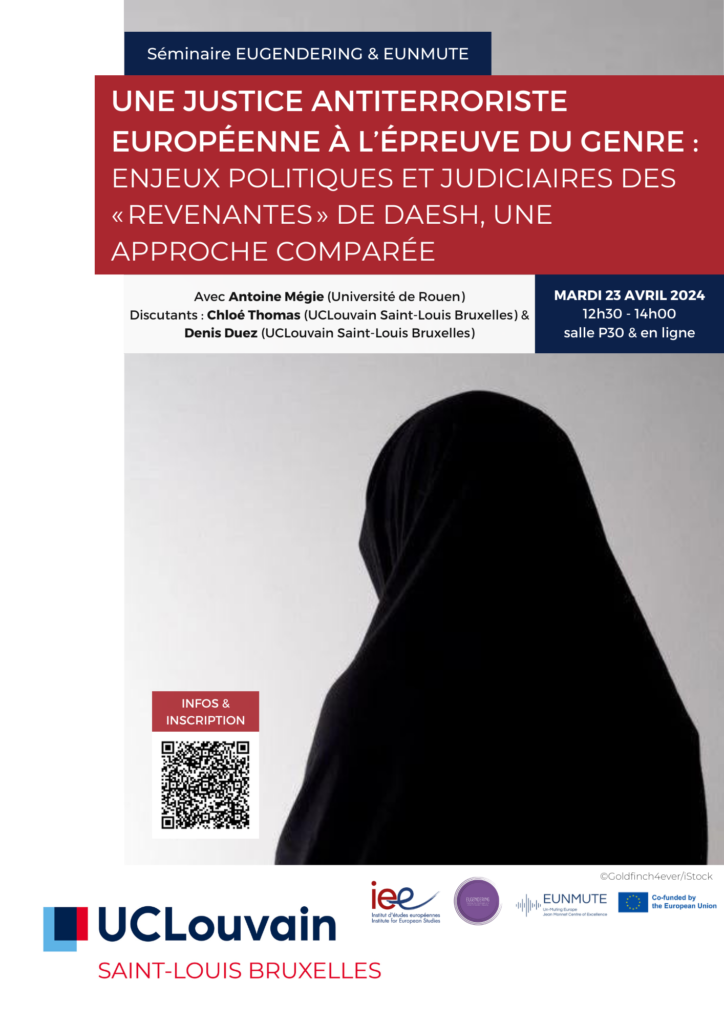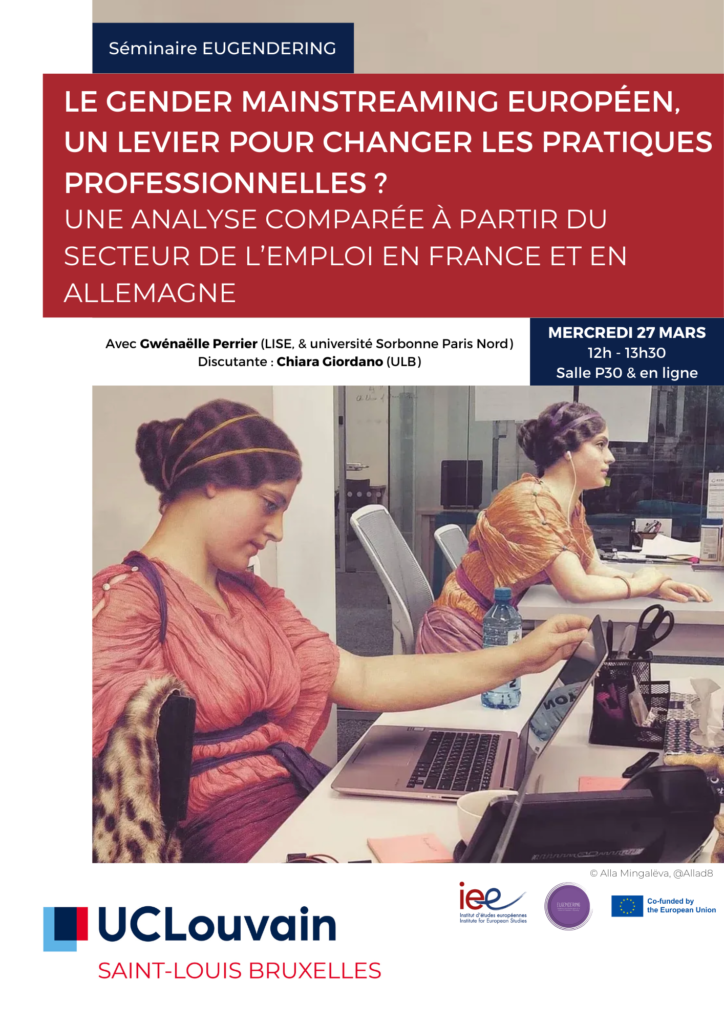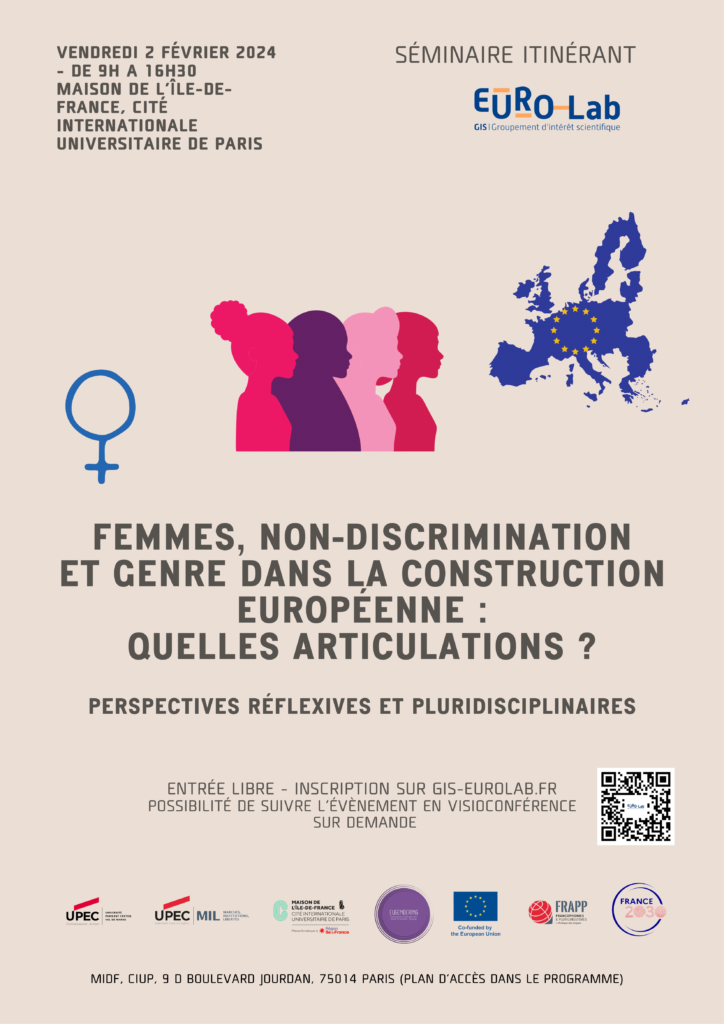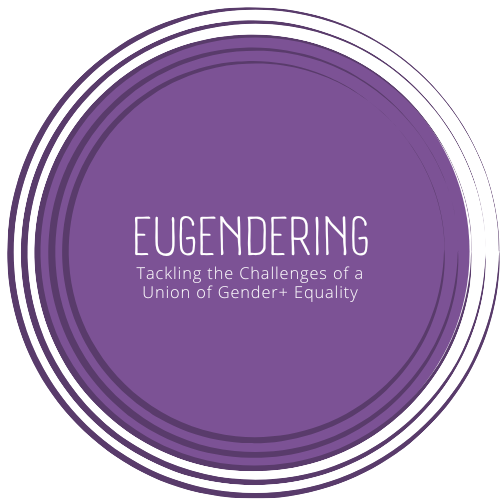Discover our research seminars!
• Une justice antiterroriste européenne à l’épreuve du genre : enjeux politiques et judiciaires des « revenantes » de Daesh, une approche comparée – 23 avril 2024

Avec Antoine Mégie (Université de Rouen)
Discutant.e.s: Chloé Thomas (UCLouvain Saint-Louis Bruxelles) & Denis Duez (UCLouvain Saint-Louis Bruxelles)
Résumé: D’abord fantômes, puis seconds rôles et enfin organisatrices de filières jihadistes, les femmes sont apparues progressivement comme des personnages centraux des scènes d’audience dans les procédures d’accusation et de condamnations de la lutte contre le terrorisme. Depuis 2020, les « revenantes » ou « returnees » comme il est d’habitude de les nommer désormais dans plusieurs pays européens, focalisent une part importante des débats politiques, des problématiques judiciaires mais aussi des recherches académiques sur la lutte contre le terrorisme et la radicalisation.
En ancrant notre analyse dans la filiation des travaux historiques et sociologiques relatifs à la violence et à l’engagement politique des femmes, et en écho à (…)
More information here
Previous events

Avec Gwénaëlle Perrier (LISE & université Sorbonne Paris Nord)
Discussion : Chiara Giordano (ULB)
Résumé: Les politiques française et allemande de lutte contre le chômage contribuent-elles à réduire les inégalités entre les sexes sur le marché du travail ? Dans un contexte où l’Union européenne valorise le “gender mainstreaming”, dans quelle mesure l’action des pouvoirs publics (saisie ici à travers le cas des services publics de l’emploi et de leurs professionnel·les) contribue-t-elle à corriger, ou au contraire renforcer, les inégalités liées au genre?
L’enquête de terrain, centrée sur deux cas locaux, français et allemand, montre que (…)
More information here
• Anti-gender movements in Georgia and Ukraine: political homophobia and a ‘clash of values’ in the context of Russia’s invasion of Ukraine – February 14, 2024
With Maryna Shevtsova (KULeuven)
Discussants: Alexandra Ana (ULB) & Laura Luciani (UGent)
Femmes, non-discrimination et genre dans la construction européenne : quelles articulations ? Perspectives réflexives et pluridisciplinaires – 2 février 2024
– Journée d’études portée par le GIS Euro-Lab en partenariat avec la Chaire EUGENDERING, le laboratoire MIL (UPEC), la Maison de l’Ile de France (CIUP) et l’EUR FRAPP –

Organisation: Laure Clément-Wilz (UPEC) & Sophie Jacquot (UCLouvain Saint-Louis Bruxelles)
Où ? Paris, Cité internationale, Maison de l’Ile de France
Résumé: Alors que l’Union européenne se présente comme une organisation régulatrice de l’égalité hommes-femmes, cette journée d’études interdisciplinaire cherche à questionner ce postulat. L’Union européenne et ses politiques ont-elles paradoxalement des effets discriminatoires sur les femmes et sont-elles porteuses de représentations paternalistes? Le langage de l’Union, à travers les concepts qu’il mobilise, entretient-il des phénomènes de (…)
Plus d’infos ici
• Lobbying for Intersectionality: civil society organisations and the EU’s anti-discrimination policy – November 10, 2023
– In collaboration with the EUNMUTE Centre of Excellence –
Oriane Calligaro is an Associate Professor in Political Science at ESPOL and a Visiting Professor at the College of Europe, Bruges. She is also an Associate Researcher at the Université libre de Bruxelles (CEVIPOL) and Co-Editor-in-Chief of the journal Politique européenne.
Discussants: Marta Bucholc (University of Warsaw) and Raphaële Xenidis (Sciences Po)
• Le mythe d’Europe: la “particularité universelle” de l’Europe et la différence sexuelle – Septembre 22, 2023
Andréa Delestrade est doctorante, en co-tutelle entre le European Institute de la London School of Economics (LSE), et l’université d’Essex. Sa thèse explore les contradictions de l’Europe comme espace simultanément universel et particulier, contradictions qui sont exposées par la question de l’incarnation de l’Europe. La matérialité des corps confronte les discours, notamment phénoménologiques, d’universalisme européen, et ses exclusions, en particulier sous le prisme de la race, du genre, et de la sexualité.
Discutante: Florence Delmotte (UCLouvain Saint-Louis Bruxelles)
• The role of the EU in including women in peace processes – September 28, 2023
– In collaboration with the EUNMUTE Centre of Excellence –
Julia Vassileva is a PhD researcher and lecturer in International law and Security studies at the School of Governance, Law and Society at Tallinn University, Estonia. She previously worked in Brussels for the EU Commission’s DG NEAR and the EEAS; and holds degrees in Law and IR from the University of Oxford, the College of Europe, and Vienna University. She has been a visiting lecturer at the Georgian Institute of Public Affairs in Tbilisi and at Bilkent University in Ankara; and a researcher at the Universities of Cambridge and Oxford, and the UN-ILC in Geneva.
Discussant: Maria Martin De Almagro (UGhent)
More info here
• Intersectionality Mainstreaming in EU Equality Policies: Reflections on the Promises and Perils of a Novel Approach – May 10, 2023
Serena D’Agostino is a Postdoctoral Researcher at the Centre for Migration, Diversity and Justice (CMDJ) at the Brussels School of Governance (BSoG), Vrije Universiteit Brussel (VUB). She is the coordinator of the VUB Strategic Research Programme Enhancing Democratic Governance in Europe (EDGE). She regularly serves as a commissioned expert to the EU Agency for Fundamental Rights (FRA) for its annual Fundamental Rights Report (chapter on Roma Equality and Inclusion, Belgium). Her research interests lie at the crossroads of (political) intersectionality, activism/social movements and minority politics and rights, with a focus on Romani (gender) politics and Roma (women’s) rights in Europe. Her work has been published in Politics, Groups, and Identities, the European Journal of Politics and Gender, the International Feminist Journal of Politics, and the Journal of Diversity and Gender Studies, among others.
Discussant: Pauline Cullen (Maynooth University)
• A conversation about Markus Thiel’s latest book “The European Union’s International Promotion of LGBTI Rights: Promises and Pitfalls” – April 28, 2023
Markus Thiel is Professor in the Department of Politics and International Relations at the Green School of International and Public Affairs at Florida International University, Miami. He also directs FIU’s EU-Jean Monnet Center of Excellence. His research interests are the political sociology of the EU and European Politics more generally, Identity Politics and LGBTI Politics.
- Organisation: Sophie Jacquot (Université Saint-Louis – Bruxelles)
- Chair and mediator: Serena D’Agostino (Vrije Universiteit Brussel)
- Discussion: David Paternotte (Université libre de Bruxelles)
More info here
• The Politics of Social In/Exclusion in the EU: Civic Europe in an Age of Uncertainty: A Working Lunch with Markus Thiel – April 26, 2023
Discussion on the book edited by Markus Thiel, Ernesto Fiocchetto and Jeffrey D. Maslanik to be published by Palgrave Macmillan in 2023
With: Serena D’Agostino (Vrije Universiteit Brussel), Charlotte Dahin (Université Saint-Louis – Bruxelles), Clémence Deswert (Université Libre de Bruxelles), Fanny Faccenda (Université Saint-Louis – Bruxelles), Sophie Jacquot (Université Saint-Louis – Bruxelles), Bastiaan Redert (University of Antwerp)
• Que faut-il attendre de la proposition de directive sur la transparence salariale entre les femmes et les hommes ? – 15 février 2023
This event was held in French.
Nicolas Moizard est professeur à l’Université de Strasbourg (Institut du travail). Spécialiste de droit social français et européen, il travaille notamment sur les discriminations et sur la relation individuelle et collective du travail. Sur le sujet en lien avec le séminaire, il a notamment publié « La proposition de directive sur la transparence salariale entre les femmes et les hommes, avancées et incertitudes », Revue de droit du travail, 2021, p. 431-440.
Discutantes : Frédérique Bartlett (CGT), Veronika Lemeire (Université de Hasselt)
• L’avortement dans l’Union européenne aujourd’hui : état des lieux et obstacles – 8 novembre 2022
This event “Abortion in the European Union today: state of play and obstacles” was held in French.
Bérengère Marques-Pereira (ULB) est sociologue. Elle est notamment spécialiste de la citoyenneté sociale et politique des femmes en Europe et en Amérique latine, et des processus de politisation et de décision sur le droit à l’avortement. Elle a créé le groupe « Genre et politique » de l’ABSP.
Bérengère Marques-Pereira nous présente son ouvrage paru en 2021, intitulé L’avortement dans l’Union européenne : acteurs, enjeux et discours.
Ce séminaire est organisé conjointement par la Chaire Jean Monnet EUGENDERING et le Groupe « Genre et politique » de l’ABSP.
